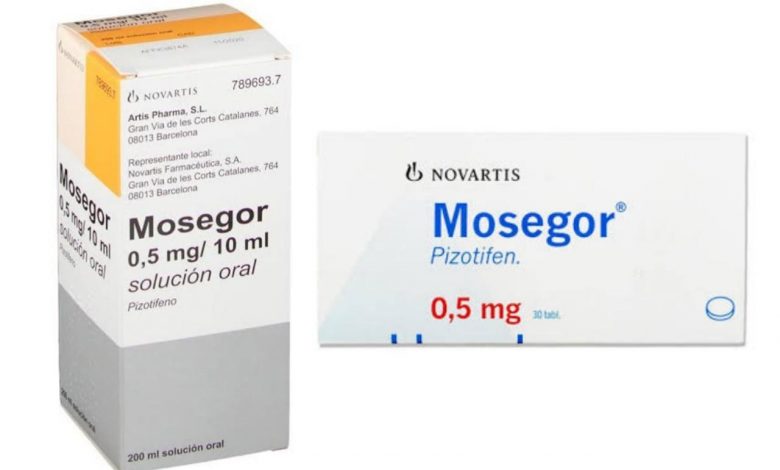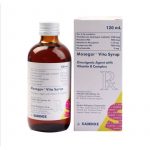Mosegor: Uses, Benefits, Dosage, Side Effects Warnings

Mosegor is a brand of pizotifen, a medication used to prevent a certain type of headache (vascular headaches such as migraine headaches). It helps to reduce the frequency and severity of your headaches. This medication should not be used to treat a migraine headache after it has started or to prevent other types of headaches such as tension headaches,
Mosegor is also used as an appetite stimulant to promote weight gain in patients with low body weight (whose appetite has been reduced or lost).
Mosegor may also be used as an antidepressant, or for the treatment of anxiety or social phobia. Studies also suggest that Mosegor could be used in the treatment of serotonin syndrome or MDMA overdose.
This medicinal product contains 2% ethanol (alcohol), which corresponds to an amount of 200 mg per 10 ml, equivalent to 4 ml of beer or 1.7 ml of wine. This medicine is harmful to people with alcoholism. Alcohol content should be taken into account for pregnant or lactating women, children, and high-risk populations, such as patients with liver disease or epilepsy.
How should I take Mosegor?
Take this medication by mouth with or without food, usually 3 times daily or as directed by your doctor. Your doctor may direct you to start with 1 dose at bedtime, then slowly increase your dose.
The dosage is based on your medical condition and response to treatment.
Do not suddenly stop taking this medication without consulting your doctor. “Rebound headaches” may occur when the drug is suddenly stopped. Your dose should be gradually decreased over a 2-week period.
When used for an extended period, this medication may not work as well and may require different dosing. Talk with your doctor if this medication stops working well.
It may take up to 4 weeks to see whether the medication will be effective for you. Tell your doctor if your headaches persist, worsen, or increase in number.
What happens if I miss a dose?
If you miss a dose, take it as soon as you remember. If it is near the time of the next dose, skip the missed dose. Take your next dose at a regular time. Do not double the dose to catch up.
What happens if I overdose?
If someone has overdosed and has serious symptoms such as passing out or trouble breathing, call 911. Otherwise, call a poison control center right away. US residents can call their local poison control center at 1-800-222-1222. Canadian residents can call a provincial poison control center. Symptoms of overdose may include extreme drowsiness, fast heartbeat, nausea, and loss of coordination.
What if I stop taking Mosegor?
Do not change or stop the medication without asking your doctor. Your doctor may recommend gradually reducing your dose before you stop treatment. This is done to prevent worsening health and reduce the risk of withdrawal symptoms such as depression, tremors, nausea, anxiety, feeling unwell, dizziness, sleep disorders, and weight loss. If you have any questions about the use of this medicine, ask your doctor or pharmacist.
Can a pregnant or breastfeeding woman take Mosegor?
No, if you are pregnant or breastfeeding avoid taking Mosegor. Experience with Mosegor in pregnancy is limited so it should only be used in special circumstances, which your doctor will discuss with you. Tell your doctor if you are or plan to become pregnant.
Can I drink alcohol while taking Mosegor?
Avoid alcohol consumption while taking Mosegor because it may increase the risk of side effects, especially the sedative effects of this medicine.
What are the side effects of Mosegor?
Drowsiness, increased appetite, weight gain, tiredness, nausea, headache, or dry mouth may occur. If any of these effects persist or worsen, tell your doctor or pharmacist promptly.
Remember that your doctor has prescribed this medication because he or she has judged that the benefit to you is greater than the risk of side effects. Many people using this medication do not have serious side effects.
Tell your doctor right away if any of these unlikely but serious side effects occur:
- eye pain
- dark urine
- persistent nausea and vomiting
- severe stomach and abdominal pain
- yellowing eyes or skin
- vision changes
- mood changes (e.g., confusion, depression, nervousness)
- swelling of the ankles or feet
- decreased sexual ability
A very serious allergic reaction to this drug is rare. However, seek immediate medical attention if you notice any symptoms of a serious allergic reaction, including:
- rash
- itching and swelling (especially of the face/tongue/throat)
- severe dizziness
- trouble breathing
This is not a complete list of possible side effects. If you notice other effects not listed above, contact your doctor or pharmacist.
In the US –
Call your doctor for medical advice about side effects. You may report side effects to FDA at 1-800-FDA-1088 or at www.fda.gov/medwatch.
In Canada – Call your doctor for medical advice about side effects. You may report side effects to Health Canada at 1-866-234-2345.
Precautions
Before taking Mosegor, tell your doctor or pharmacist if you are allergic to it; or if you have any other allergies. This product may contain inactive ingredients, which can cause allergic reactions or other problems. Talk to your pharmacist for more details.
This medication should not be used if you have certain medical conditions. Before using this medicine, consult your doctor or pharmacist if you have:
- stomach or intestinal blockage
- Before using this drug, tell your doctor your medical history, especially of:
- glaucoma (narrow-angle)
- difficulty urinating (e.g., due to enlarged prostate)
- breathing problems (e.g., asthma, emphysema)
- diabetes
- heart or blood vessel disease (e.g., stroke, coronary artery disease, irregular heart rhythm)
- high blood pressure (hypertension)
- overactive thyroid (hyperthyroidism)
- kidney disease
- liver disease
This drug may make you dizzy or drowsy. Alcohol or marijuana (cannabis) can make you more dizzy or drowsy. Do not drive, use machinery, or do anything that needs alertness until you can do it safely. Avoid alcoholic beverages. Talk to your doctor if you are using marijuana (cannabis).
During pregnancy, this medication should be used only when clearly needed. Discuss the risks and benefits with your doctor.
This drug may pass into breast milk and could have undesirable effects on a nursing infant. Therefore, breast-feeding is not recommended while using this drug. Consult your doctor before breast-feeding.
What drugs can interact with Mosegor?
Drug interactions may change how your medications work or increase your risk for serious side effects. This document does not contain all possible drug interactions. Keep a list of all the products you use (including prescription/nonprescription drugs and herbal products) and share it with your doctor and pharmacist. Do not start, stop, or change the dosage of any medicines without your doctor’s approval.
Some products that may interact with this drug are:
- antihistamines applied to the skin (such as diphenhydramine cream, ointment, spray)
Taking MAO inhibitors with this medication may cause a serious (possibly fatal) drug interaction. Avoid taking MAO inhibitors (isocarboxazid, linezolid, methylene blue, moclobemide, phenelzine, procarbazine, rasagiline, safinamide, selegiline, tranylcypromine) during treatment with this medication. Most MAO inhibitors should also not be taken for two weeks before treatment with this medication. Ask your doctor when to start or stop taking this medication.
Tell your doctor or pharmacist if you are taking other products that cause drowsiness such as opioid pain or cough relievers (such as codeine, hydrocodone), alcohol, marijuana (cannabis), drugs for sleep or anxiety (such as alprazolam, lorazepam, zolpidem), muscle relaxants (such as carisoprodol, cyclobenzaprine), or antihistamines (such as cetirizine, diphenhydramine).
Check the labels on all your medicines (such as allergy or cough-and-cold products) because they may contain ingredients that cause drowsiness. Ask your pharmacist about using those products safely.
Notes
Do not share this medication with others.
Laboratory and/or medical tests (e.g., kidney/liver function) may be performed periodically to monitor your progress or check for side effects. Consult your doctor for more details.
Storage
Store at room temperature between 59-86 degrees F (15-30 degrees C) away from light and moisture. Do not store it in the bathroom. Keep all medicines away from children and pets.
Do not flush medications down the toilet or pour them into a drain unless instructed to do so. Properly discard this product when it is expired or no longer needed. Consult your pharmacist or local waste disposal company for more details about how to safely discard your product.





